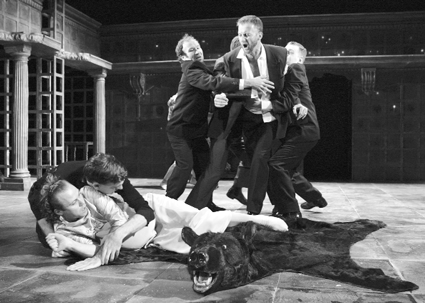All-male “Winter’s Tale,” “Manic” fiasco, breathless “Beowulf”
With its all-male casting, semi-modern dress, and setting that suggests the play is an Oedipal fantasy, Propeller’s “The Winter’s Tale,” which had a recent run at the Brooklyn Academy of Music achieves something few contemporary Shakespeare presentations are able to accomplish—it keeps the text at the center of the production. For anyone who has sat through “concept” Shakespeare where text takes a back seat to “vision,” director Edward Hall’s translation comes as a spectacular blast of intelligence whimsy and passion—proving again that a story well told needs little embellishment to be a thrilling experience. The vibrant life and exciting theatricality that filled the stage of BAM’s Harvey Theater made the play seem new and timely.
“The Winter’s Tale” offers everything a theatergoer could desire—tragedy, romance, and comedy. While the narrative might seem disjointed, with jealous tragedy quickly giving way to slapstick and bawdy comedy, the effect is of a rich world where diverse stories hurtle toward inevitable collisions. The impression under the company’s sure-handed work is cinematic, a perfect balance of epic and intimate that marks this as the most electrifying and moving production of this play, among many, that I’ve seen.
Propeller’s all-male casting may initially have been a gimmick, yet inevitably it begs the question of gender politics and dynamics both in the play and real life. Hermione, wrongly accused of infidelity with a visiting King Polixenes by her husband Leontes, as played by Simon Scardifield, is inherently feminine in demeanor, but not traditionally female—as the role is often portrayed—in confronting the accusation or in granting Leontes forgiveness. In fact, the penultimate moment of the show denies Leontes’ traditional “happily ever after,” and upends conventional tellings of this tale. Similarly, Adam Levy as Paulina, who drives one element of the plot and is the only character who consistently confronts Leontes with his blind jealousy, becomes a force to be reckoned with such as I have never seen. By freeing themselves of the traditional trappings of gender, Hall and company liberate themselves to explore the characters’ truth, and in so doing give the text new life. It is something we as a culture still struggle.
The fact that all of this richness exists in a production that is as riveting and honest as it is lyrical and warmly funny—even within the context of a plot that has no defensible logic—stands as a tribute to the power of theater. It is not literal truth, which can be argued, but art that can open the way to the individual heart where a richer, more human truth is to be found.
Another style of storytelling altogether is on display is Sarah Schulman’s messy “Manic Flight Reaction” at Playwright’s Horizons. This is playwriting of the blatantly manipulative variety. Unlike Shakespeare’s romance, Schulman’s realism requires an internal logic if one is to believe the characters and the situations.
Schulman has not done her homework, and the result is lazy and tedious, despite the game efforts of a charming cast, led by the always-wonderful Deirdre O’Connell in the central role of Marge. Schulman has tried to write an indictment of our media-obsessed culture and how that has led to a corruption of values and isolation. Though a nice idea in the abstract, Schulman displays such an apparent lack of understanding of contemporary culture that the entire play seems false. How could Marge, a professor who teaches undergraduates about culture be so out of touch with it herself and consider that a virtue? No wonder she had a hard time getting a job.
Schulman, who in interviews emphasizes her own lesbianism, has blamed her lack of a major hit to date on gender politics. Sorry, this is simply uninspiring theater. In addition to bad plotting and unbelievable characters, she has fallen pretty to the very things anti-gay forces rely on—the use of trigger words to create emotional reactions. The arguments about consciously repressed sexuality being used to achieve mainstream ends are by now hackneyed. With nothing new to say, the play is just a bleak sitcom with clumsy dialogue and disconcerting shifts in narrative style.
I can’t tell you exactly what kind of narrative “Beowulf” at the Irish Repertory is. I can tell you that the 75-minute gem seems, to me, more like a stage oratorio than anything else. Alive with creative storytelling—puppets, songs, amazing stage pictures—and one of the most intriguing new scores I’ve heard in a long time, the retelling of the classic epic is a miniature masterpiece that evokes both the Muppets and the medieval Mystery Plays. It is a daring piece, which gets a significant portion of its excitement from its risk-taking. The richly creative direction is by Charlotte Moore and the show has music and lyrics by Lenny Pickett and adaptation and lyrics by Lindsey Turner.
The seven men in the cast have astonishing voices, particularly Richard Barth in the title role. This is a revelatory and exciting show that will not be to all tastes, but it’s fearless theatricality in the Irish Rep’s small space, and the sheer skill on display won me absolutely.
gaycitynews.com

































